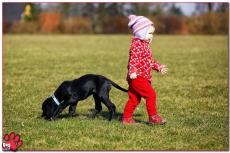Dogs and toddlers, socially they are a lot alike
Toddlers are more like dogs than they are like monkeys, a nice introduction, but when it comes to cooperative communication, it is a proven fact. Researchers from the University of Arizona compared children from 2.5 years old with dogs and chimpanzees. As a result, in certain social skills and intelligence dogs are amazingly similar to humans at an early age.
The results are more than just nice to know for psychologists, scientists will get a better understanding of how humans socially evolved. In addition, it can help to learn more about specific disabilities as autism. So far investigations used almost always great apes to serve as reference material with humans, but that only helps to solve a small piece of the puzzle.
"There are different kinds of intelligence, and the kind of intelligence that is very important for man is social by nature, a kind of intelligence dogs have to an onbelievable extent," says Dr. Evan MacLean, of the School of Anthropology at the University of Arizona.
"But there are other aspects of cognition, such as the way we reason about physical problems, which dogs differ very much from us. So there we do not compare to dogs. But on this special set of social skills there is a strong agreement."
Chimpanzees are good at spatial reasoning, and dealing with their physical environment, but they are not very good in more social aspects, such as following a pointing finger or a focused look of their opponent. Dogs do that just as well as small children, and thus exhibit a remarkable social behavior.
The researchers studied 552 dogs of all kinds, assistance dogs, military sniffer dogs, and of all races. By toybased games during which all sorts of goodies were hidden as a means of testing, they could see whether dogs respond to non-verbal signals, like children. Also, the chimpanzees were given their chance, just like the toddlers, in ths play. As it turned out, dogs and children performed about equally well, chimpanzees much less.
In the last decade, a growing body of research has been focusing on what exactly makes human psychology special. Scientists have observed that our basic social communication skills that begin to develop around nine months are what first seem to set humans apart from other species, said MacLean, also director of the Arizona Canine Cognition Center at University of Arizona.
One possible explanation for the similarities between dogs and humans is that both may have evolved under similar pressures that favored “survival of the friendliest,” with benefits and rewards for more cooperative social behavior.
“Our working hypothesis is that dogs and humans probably evolved some of these skills as a result of similar evolutionary processes, so probably some things that happened in human evolution were very similar to processes that happened in dog domestication,” MacLean said. “So, potentially, by studying dogs and domestication we can learn something about human evolution.”
The study is published in the journal Animal Behaviour.





